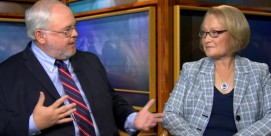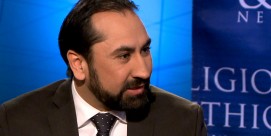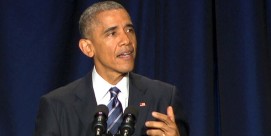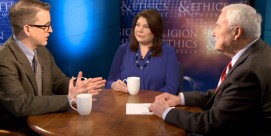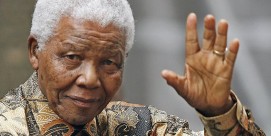Howard Rhodes: Democratic Faith Made Militant

Should the American people harness their admiration for the military to revitalize the virtues of democratic engagement? Can we harness this admiration without undermining our ability to keep our militaristic overconfidence in check, especially in the face of increasing economic and military competition from China and beyond?
President Obama’s State of the Union address frames his understanding of the challenges and opportunities we face with the suggestion that emulating the virtues of America’s armed forces would enable us to become a more cohesive and mission-focused community. The challenges he notes are well-known—economic stagnation, declining standards of living, gross inequality, and decreasing confidence in our power both to improve our lot at home and maintain our influence abroad. For the president, however, America’s economic and geopolitical prospects are better than many believe. What we should really worry about is the increasingly prominent role that political cynicism and cultural and religious difference-mongering play in our political life. As the president rightly understands, cynicism about Washington rarely translates into energetic local efforts to address the inequalities in our midst or to put constructive pressure on our representatives for “nation building” here at home. With noteworthy understatement, the president suggests that our tendency to “obsess over [our] differences” is undermining our ability constructively to confront our challenges and opportunities. The problem is as much about our political culture as it is our political policies. The president suggests that the military provides the nation and its leaders a much-needed example of joining together in trust to accomplish a common mission.
What are we to make of this claim? To an extent, President Obama is simply calling for more cooperation in American politics. This is a valuable point, as far as it goes, but is uninteresting. If we take President Obama to suggest something bigger, then we may understand him as echoing ideas from the roots of American progressivism and replaying some of its dilemmas. John Dewey once argued that Americans were the inheritors of a democratic faith in our ability to redress social problems through conversation and cooperation. This faith, Dewey argued, is implicit in our very way of doing things, despite the still-powerful, obfuscating influences of superstition, moralism, and ideological rigidity. What we need, Dewey claimed, is to make this faith “explicit and militant,” to embrace it self-consciously as a source of our common resolve (John Dewey, A Common Faith (Yale University Press, 1934, p. 87)). Made militant, democratic faith can propel what William James once called “the moral equivalent of war”—the marshaling of civic passions for a cohesive social effort against the sorts of inequality, hopelessness, and degradation many Americans now face. For Dewey, however, democratic militancy was deeply distrustful of American militarism. War, Dewey recognized, can lead to forms of social and political discipline that are antithetical to democratic cooperation and exchange. For the democratic tradition descended from Dewey, therefore, the challenge of American life is to identify forms of democratic solidarity that do not feed off militarism abroad.
President Obama plays on these ideas—with a twist. For the president, the end of the war in Iraq, and our decreasing commitment in Afghanistan, provides more than a much-needed infusion of investment dollars that we could turn toward more productive purposes. It allows the nation to turn its militant energies from imperial policing abroad and refocus them at home. By nursing our admiration for our military’s virtues, he suggests, we can transform our beleaguered democracy into a more cohesive and mission-focused political community. Further, we can transform our admiration for the military vocation into a greater estimation of our own vocation as citizens.
The realism of this suggestion is immensely attractive. Rather than condemning the militaristic energies that got us into Iraq and Afghanistan, the president attempts to redirect those energies to more democratic purposes. William James would have been proud. Yet there are dangers here. The president’s vision of a militantly democratic community—a community characterized by at least some of the martial virtues—depends implicitly on the very militarism that the president was widely admired for criticizing. The mission-focused social cohesion that he seems to propose is fed on a diet of military exploits, of Navy SEALs working as a team to kill terrorists in far-off places.
Unless the president is merely cheerleading for more “teamwork” in American politics—an idea scarcely worth hearing—he is suggesting we buy an expanded sense of and passion for citizenship with the coin of militaristic enthusiasm. Instead of taking the end of the wars in Iraq and Afghanistan as an opportunity to rethink the vice of militaristic overconfidence, President Obama proposes simply to reduce American military action to a minor drama that gives the larger drama of domestic democracy its energy. As long as the military drama remains minor—for example, with small special operations units engaging in targeted strikes—it provides the necessary thrill without provoking the more destructive forms of solidarity to which militarized societies are prone.
The problem with this view, as I see it, is that, once the bitter lessons of the Bush-era wars in Iraq and Afghanistan are old news, there will be little to prevent an American society fed by militaristic enthusiasm from giving in to the temptations of military power. Especially in future periods of uncertainty and threat, a political society that sustains itself through an embrace of martial valor will seek to discipline itself in ways more in keeping with war than democratic ideals.
Democratic citizenship undoubtedly requires courage, selflessness, and teamwork. It takes courage to make yourself vulnerable to viewpoints with which you seriously disagree. It takes selflessness to make the care and upkeep of the community a priority alongside the demands of earning a living for oneself and for a family. It takes teamwork to organize people effectively to make a difference in the life of a community, especially in the face of entrenched interests. But one may well question whether it is plausible or desirable to promote these virtues by harnessing the nation’s admiration for the military.
Howard Rhodes has taught at the University of Iowa and is currently is a J.D. candidate at Duke University School of Law. His research interests include the ethics of war, international humanitarian law, and religion and international relations.


